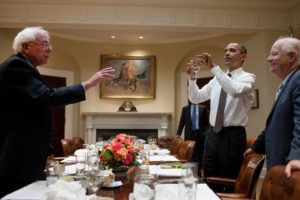
President Barack Obama jokes with Sen. Bernard Sanders, Ind-Vt., and Sen. Ben Cardin, D-Md., right, following lunch with Senators in the Roosevelt Room of the White House, Aug. 4, 2010.
Despite his attempts to win their hearts, Democrats seem unsure about voting for former Vice President Joe Biden. To test the waters, they have tried on several other candidates during the primary. Now it is Senator Bernie Sanders’ turn to enjoy a poll surge.
Bernie’s poll numbers have climbed to 23.4% in the Real Clear Politics (RCP) average of polls for the 2020 Democratic primary. That’s a 4.2 point boost since my last update. The “Democratic” Socialist is now trailing Biden by only 5.3 points. That’s the closest Sanders has come yet to a lead in the race. For his part, Biden is steadily holding his near-30% support, with 28.7% in the latest RCP average.
More and more, this race looks like the 2012 GOP primary. The similarities are many:
- a high number of candidates,
- an early front-runner, blessed by the establishment,
- and several surges by challengers attempting to take the lead.
Romney faced down surges by Rep. Michelle Bachmann, Gov. Rick Perry, pizza magnate Herman Cain, former Speaker of the House Newt Gingrich (twice), and, finally, Sen. Rick Santorum. Biden has so far faced challenges by Sen. Kamala Harris, Sen. Elizabeth Warren, Mayor Pete Buttigieg, and now Sen. Bernie Sanders.
There are also some surprising similarities in the timing and duration of the challengers’ surges, though the comparisons aren’t perfect.
Michelle Bachmann/Kamala Harris
Bachmann’s August 2011 surge challenged Romney about the same time Kamala Harris’ did for Biden. Both candidates achieved about the same level of poll support, with Bachmann peaking at 14% and Harris peaking at 15.2%.
Rick Perry/Elizabeth Warren
Then came September 2011, and Rick Perry’s moment. In the Democratic race, Elizabeth Warren began her surge in September. Perry gained reach higher levels of support (31.8%) than Warren (26.8%) but flamed out faster, around September 19.
Herman Cain/Elizabeth Warren
Warren’s surge lasted well into November. By that time in 2011, fickle GOP voters had already moved on to Herman Cain and his 9-9-9 tax plan. Both candidates were knocked from their perches by their past: Cain by allegations of sexual misconduct, Warren by a story she told of being fired because of pregnancy. Her story didn’t match up with an earlier one she had given on the issue. Warren’s credibility was already in doubt because of her previous false claims to Native American ancestry. The new knock to her credibility was too much. Her polls peaked on October 9, just a day after a CBS interview called attention to the stories’ discrepancies.
Newt Gingrich/Pete Buttigieg
Beginning at the end of October 2011, Republicans were looking for a new option, and they found Newt Gingrich. Democrats felt similarly in October 2019 and landed on Buttigieg. Buttigieg peaked on November 30 at 11.8%. Gingrich peaked slightly later on December 13 at 35% support, dropped to 16.2% on January 16, then surged again to 31.3% on January 28 before finally fading into the background.
Rick Santorum/Bernie Sanders
At the start of January 2012, during Gingrich’s first drop from favor, Rick Santorum began picking up support. In 2020, Bernie Sanders started to gain momentum at the beginning of January as well. February 28, 2012, was the last day Santorum led Romney in the polls. From there on out, Romney was the uncontested leader.
Now comes Bernie Sanders to challenge Biden’s lead. Sanders recently beat Biden in a CNN poll that ran from January 16 to January 19. It was a surprise for many but hasn’t been reproduced by any other polls since, though margins have narrowed.
Is Bernie the 2020 Version of Santorum or Is He Really McCain?
Are voters just kicking the tires on the old socialist? Or is Bernie the candidate Democrats secretly wanted all along? If an insurgent Bernie can pull off a win, the race will look much more like the GOP contest of 2008. That race ended with a win by Sen. John McCain few had predicted. It began with McCain’s surprise triumph in New Hampshire. It just so happens that Bernie Sanders is leading in New Hampshire. He’s also leading in Iowa and has moved into the second place position in Nevada and South Carolina.
Biden 2020 vs. Romney 2012 Parallels
The significant similarities between Biden and Romney are their steady levels of support throughout the primary and their support from the party establishment. Romney never saw his support drop below 16.1%. Biden hasn’t seen his fall below 26%. Both were considered the party establishment’s “next in line” on day one of the primary.
Unlike Romney, who lost the RCP average lead to four different candidates five different times, Biden has only relinquished it on one day during the entire primary campaign to this point. That was October 8, when Warren led Biden by .2 percentage points.
Will Voters Choose Ideology Over Electability?
In most polls gauging head-to-head matchups between President Trump and the Democratic candidates, Joe Biden outperforms Bernie Sanders. But Sanders epitomizes the beliefs of the activist left wing of the Democratic Party. The party’s ideologues support Sanders, who over decades has remained consistent in his support for big government/socialism.
The danger for Sanders is living up to the ever-changing standards of the ideologically pure. Sanders is currently enduring an attack from activists angry with him over his acceptance of an endorsement from podcaster/comedian/UFC announcer Joe Rogan. The activists dislike some of Rogan’s past statements and are upset with Sanders for associating with such a heretic. Sanders’ own base could eat him before he even gets a chance to challenge Biden for the lead.
As votes begin to come in, the results will answer the question of whether the Democrats will choose ideology or electability.
See all Election Tracker 2020 coverage by clicking here.





